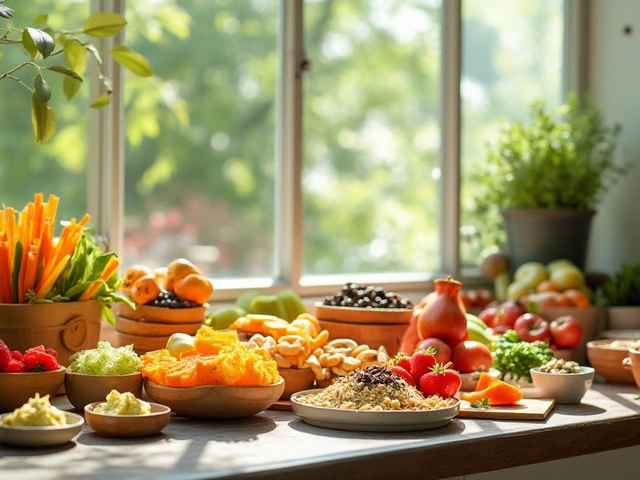Food Science: Simple, Real Ways Food Affects Your Health
Food science is often presented with flashy claims—superfoods, magic spices, and quick fixes. The truth? Small changes backed by clear science make the biggest difference. This page collects practical ideas you can use today, from better breakfasts to snacks that actually help your mood and energy.
Start with the gut. Your microbiome affects digestion, energy, and even mood. Eating a mix of fibers—vegetables, fruits, whole grains, and legumes—feeds good bacteria. Fermented foods like yogurt, kefir, kimchi, and sauerkraut add helpful microbes, while avoiding excess sugar and ultra-processed snacks keeps bad bugs from taking over.
Think about breakfast. A balanced morning meal stabilizes blood sugar and fuels focus. Combine protein (eggs, yogurt, or nut butter), slow carbs (oats, whole-grain toast), and healthy fats (avocado, seeds). A quick option: Greek yogurt topped with oats, berries, and a spoon of flaxseed. It’s fast, filling, and supports gut health and energy.
Snacking matters. Choose snacks that reduce cravings instead of causing them. Pair protein with fiber—apple slices with peanut butter, hummus and raw carrots, or a handful of nuts and a piece of fruit. These choices help with weight control and steady energy through the day.
Spices, supplements, and drinks that do real work
Turmeric shows clear anti-inflammatory effects when taken with black pepper and a fat source. It’s not a cure-all, but adding turmeric to meals or smoothies can help if you use it regularly. Health juices can boost vitamins if you include greens and low-sugar fruits, but whole foods are better for fiber. If you juice, keep portions small and add a protein or fat to slow sugar absorption.
Practical tips that actually stick
Read labels for added sugar, hidden oils, and long ingredient lists. Cook more at home—simple batch cooking saves time and keeps you in control of salt and sugar. Try a two-week experiment: swap one ultra-processed item per day for a whole-food alternative and notice changes in energy and cravings. Use a food tracking app for a few days to learn real portions; small awareness often leads to steady improvement.
When you read nutrition headlines, ask: was the study done on humans or cells, how many people were involved, and what was the real outcome? Single studies aren’t proof. Look for consistent results across many trials or clear explanations from trusted sources.
Food science is useful when it’s simple and repeatable. Focus on fiber-rich plants, regular protein, less added sugar, and real cooking. Try small swaps that are easy to keep—those add up faster than any fad. Read our guides and recipes to start practical, science-backed changes today.
Start small: pick one food swap and stick with it for two weeks. Track how you feel—energy, sleep, digestion—and note cravings. If you sleep better or your energy stabilizes, keep that habit. Want step-by-step help? Try our healthy breakfast and snack guides, or follow our juice and turmeric tips. Small wins build real change. Check posts below for recipes and quick ideas.
Healthy Diet: Unlocking the Science Behind Smart Eating
Eating right isn't just about counting calories or skipping dessert. It's a blend of knowing what to eat and understanding why it matters. This article explores the essential components of a healthy diet, the science backing it up, and practical tips to incorporate nutritious choices into everyday meals. Dive into the world of balanced eating and learn how small changes can lead to big health boosts.
View More





